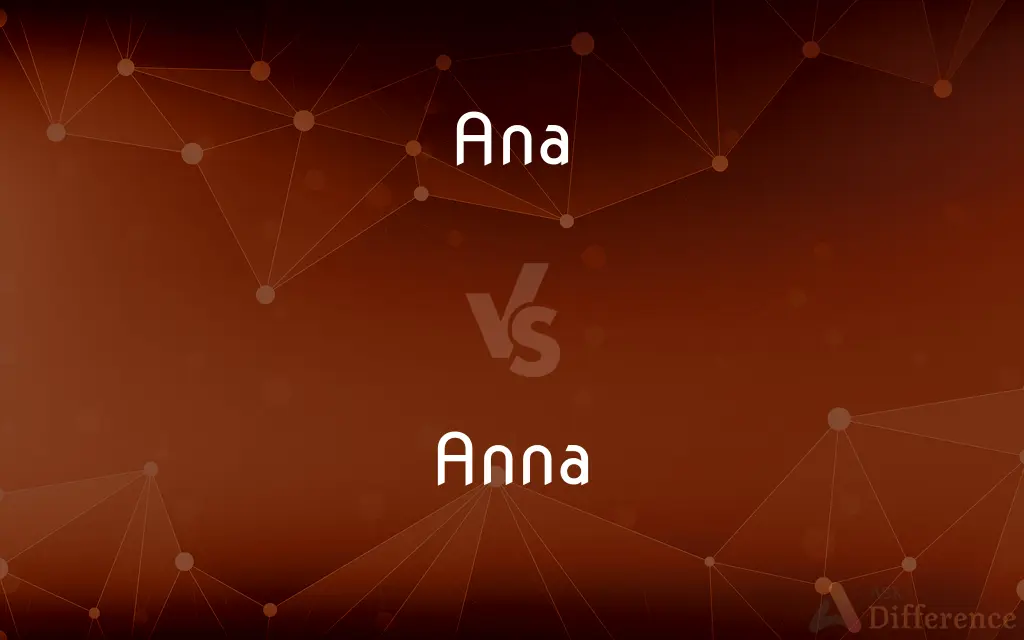Ana vs. Anna — What's the Difference?
Edited by Tayyaba Rehman — By Urooj Arif — Updated on March 29, 2024
Ana often refers to a single-syllable name prevalent in Spanish and Slavic cultures, while Anna, a two-syllable name, is more common in English and other European languages.

Difference Between Ana and Anna
Table of Contents
ADVERTISEMENT
Key Differences
Ana, typically pronounced with a short, single vowel sound, is a name that resonates with simplicity and elegance across Spanish-speaking and Slavic countries. On the other hand, Anna carries a slightly longer, more melodious quality in its pronunciation, appealing to a broader range of cultures including English, German, and Italian.
Ana's spelling and phonetic simplicity make it a popular choice for those seeking a name that's both easy to pronounce and internationally recognizable. Whereas Anna's additional "n" lends it a classical feel, often associated with historical figures and royalty, thus imbuing it with a sense of tradition and depth.
In literature and popular culture, characters named Ana often embody qualities of independence and strength, reflective of the name's concise and direct nature. Meanwhile, characters named Anna are frequently depicted with complexity and nuance, mirroring the linguistic richness of the name itself.
Social trends show that Ana is particularly popular in countries with a strong Roman Catholic presence, suggesting a cultural preference for names with religious significance. Conversely, Anna has been widely adopted in a variety of linguistic and cultural contexts, demonstrating its versatility and global appeal.
Despite their similarities, the single versus double "n" variation in Ana and Anna affects not only pronunciation but also the names' aesthetic and typographic appearance, with Ana often being perceived as more modern and streamlined, and Anna as more traditional and elegant.
ADVERTISEMENT
Comparison Chart
Syllables
1
2
Cultural Prevalence
Spanish-speaking and Slavic countries
English-speaking and European countries
Historical Association
Less associated with royalty
Often associated with historical figures and royalty
Pronunciation
Short vowel sound
Longer, more melodious sound
Character Traits
Independence and strength
Complexity and nuance
Compare with Definitions
Ana
In Slavic cultures, it can signify grace or favor.
Ana's name is synonymous with elegance in her community.
Anna
Signifies tradition and elegance.
Anna chose a vintage theme for her wedding.
Ana
Often used as a nickname for longer names beginning with "Ana".
Ana, short for Anastasia, loves classical music.
Anna
A female given name common in English and other European languages.
Anna wrote a thesis on European history.
Ana
Reflects simplicity and modernity.
Ana's minimalist lifestyle is reflected in her name.
Anna
Often seen in literature and royal families.
Anna's love for reading started with fairy tales about queens.
Ana
Can be part of compound names.
Ana María enjoys celebrating both parts of her cultural heritage.
Anna
Versatile in naming conventions.
Anna goes by Ann in informal settings, showcasing the name's flexibility.
Ana
A female given name popular in Spanish-speaking countries.
Ana decided to study abroad in Spain.
Anna
Associated with grace and historical figures.
Anna Karenina, Tolstoy's famed heroine, captures the era's essence.
Ana
Anecdotes or literary gossip about a person.
Anna
A copper coin formerly used in India and Pakistan.
Ana
A collection of a person's memorable sayings.
Anna
A unit of currency in former British India equal to 12 pies or 16 rupee.
Ana
A collection of things associated with a person or place, especially a personal collection of anecdotes or conversations at table
Anna
An East Indian money of account, the sixteenth of a rupee, or about 2 cents.
Ana
Anorexia (used especially by the pro-ana movement).
Anna
A former copper coin of Pakistan
Ana
: a former subdivision of the rupee.
Ana
(in prescriptions) Of each; an equal quantity.
Wine and honey, ana [or contracted to aa] / ij
Ana
In a direction analogous to up, but along the additional axis added by the fourth dimension.
Ana
Of each; an equal quantity; as, wine and honey, ana (or, contracted, aa), ij., that is, of wine and honey, each, two ounces.
An apothecary with a . . . long bill of anas.
Ana
Mother of the ancient Irish gods; sometimes identified with Danu
Ana
A collection of anecdotes about a person or place
Common Curiosities
Are Ana and Anna pronounced differently?
Yes, Ana is usually pronounced with a short "a" sound, while Anna is pronounced with a longer, more melodious "a" sound.
What is the origin of Ana and Anna?
Ana originates from the Hebrew name Hannah, meaning "favor" or "grace," and is prevalent in Spanish and Slavic cultures. Anna shares the same Hebrew origin but is more widespread in English-speaking and European countries.
Which name is more popular globally, Ana or Anna?
Anna tends to be more popular globally due to its wider cultural acceptance and use in English-speaking countries.
Do Ana and Anna have different meanings?
Both names share the same basic meaning of "grace" or "favor," though cultural nuances and associations may add layers of meaning.
Which name is easier to spell and pronounce in multilingual contexts?
Ana is generally considered easier to spell and pronounce due to its simplicity.
Is there a difference in the number of syllables between Ana and Anna?
Yes, Ana has one syllable, while Anna has two.
Can Ana and Anna be used interchangeably in literature and media?
While technically possible, their usage often depends on cultural and linguistic contexts specific to the story or media.
Can Ana be a nickname for Anna?
It's less common but possible, as Ana generally stands as a complete name in the cultures where it is most used.
Can both Ana and Anna be found in religious texts?
Yes, both variations of the name have biblical origins and can be found in religious contexts.
Are there famous literary characters named Ana and Anna?
Yes, both names are popular in literature, with Anna Karenina being a notable example for Anna.
Which name offers more versatility in naming conventions?
Anna, due to its widespread use in various languages and cultures, offers more versatility.
Is Ana considered more modern than Anna?
In some contexts, yes, due to its simpler, more streamlined spelling and pronunciation.
How do the meanings of Ana and Anna reflect in their cultural significance?
Both names reflect grace and favor, but their cultural significance can vary with Ana often embodying a more modern simplicity, and Anna a traditional elegance.
Do Ana and Anna have different patron saints?
Depending on the cultural and religious context, the patron saints associated with Ana and Anna might vary, but they often share similar religious significances.
Do Ana and Anna carry different connotations in different cultures?
Yes, the connotation of each name can vary significantly across different cultures, reflecting varying traits and qualities attributed to each.
Share Your Discovery

Previous Comparison
Anthropod vs. Arthropod
Next Comparison
Immortal vs. InvulnerableAuthor Spotlight
Written by
Urooj ArifUrooj is a skilled content writer at Ask Difference, known for her exceptional ability to simplify complex topics into engaging and informative content. With a passion for research and a flair for clear, concise writing, she consistently delivers articles that resonate with our diverse audience.
Edited by
Tayyaba RehmanTayyaba Rehman is a distinguished writer, currently serving as a primary contributor to askdifference.com. As a researcher in semantics and etymology, Tayyaba's passion for the complexity of languages and their distinctions has found a perfect home on the platform. Tayyaba delves into the intricacies of language, distinguishing between commonly confused words and phrases, thereby providing clarity for readers worldwide.
















































